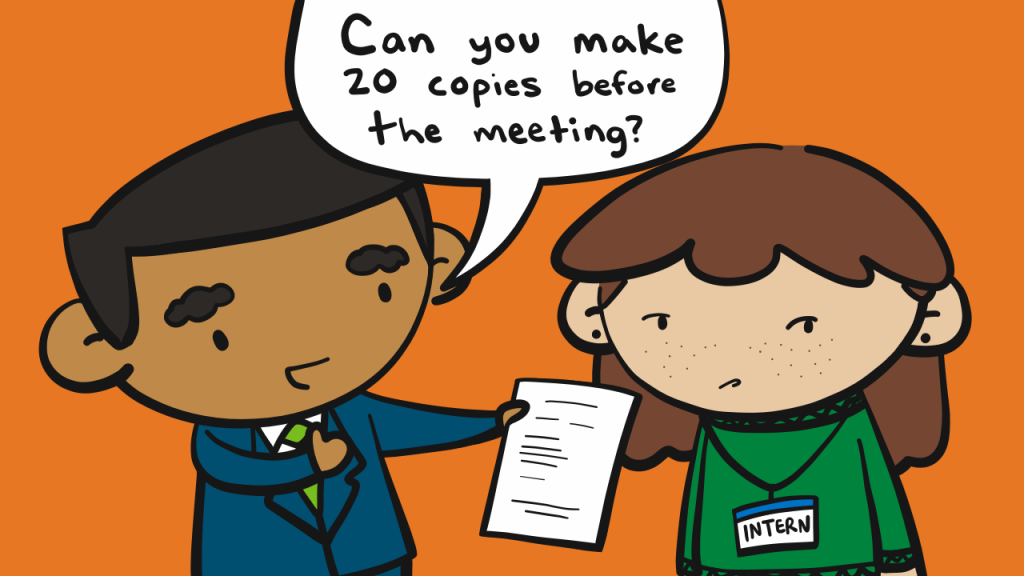Perhaps you’ve noticed that everyone in your department seems to be overworked, so you come up with the brilliant idea to hire an intern. You wouldn’t have to pay them a salary and they could pick up the slack wherever it was needed. The intern will learn valuable skills and will be able to include the experience on their resume. Everyone wins, right?
Recent lawsuits involving unpaid interns
Before you start the intern hiring process, keep in mind that it’s not always so simple. Lawsuits have been filed in recent years by unpaid interns who felt they were given only menial tasks to do with little or no supervision. Companies that have been sued by unpaid interns include Nickelodeon, Harper’s Bazaar, Fox Searchlight, NBCUniversal and Atlantic Records. Sometimes the interns won, sometimes the company won and sometimes they settled out of court. But whether anyone wins or loses a lawsuit, to avoid bad publicity and do the right thing you will want to design an internship program that complies with current laws and benefits those on both sides of the desk.
Here are some steps to take when designing an internship at your place of business:
-
Evaluate who will benefit from the internship
The first thing to do when planning what type of work the intern will be performing is to ask yourself “Who will benefit the most?” Called the “primary beneficiary” test, this means you need to evaluate whether the internship work is primarily for the economic benefit of your company or primarily for the educational benefit of the intern. If the employer is the primary beneficiary, the intern has to be paid as an employee. If the intern primarily benefits, the intern can be unpaid.
-
Follow the Department of Labor’s guidelines on internships
Following all the turmoil in courtrooms, the U.S. Department of Labor issued seven guidelines employers must follow in order to not pay their interns a salary. The training needs to be similar to what the intern would receive in an educational environment, the employer must provide a beneficial learning experience during a specific period of time, and most importantly, the work can’t displace work done by regular employees. (See below for some examples.) If any of the guidelines are not followed, it can be argued that the intern is really an employee and must be paid accordingly.
-
Partner with a college or university internship program
It is much easier to stay out of trouble if a college has oversight over the internship program and provides educational credit. Many colleges and universities have published guidelines on unpaid internships that they give to potential employers, and they follow up to make sure it is a learning experience for the student. Detailed job descriptions are provided by the company before a student is placed, the intern meets with an internship adviser from their college, and frequent check-ins by the college adviser with both the employer and the intern are made along with one or two personal visits.
-
Test yourself on what constitutes an internship
Take a look at these intern activities and rate them “A” for appropriate and “NA” for not appropriate:
- Make copies for important meetings.
- Help put together the monthly balance sheet.
- Tag along with a salesperson on a sales call.
- Fill in for the marketing employee out on maternity leave.
- Learn a software program that is only used at your company.
- Sell insurance to parents and other relatives.
- Learn how to edit a technical document.
- Answer calls on the customer service line when a regular employee is sick.
- Observe the techniques used on an assembly line to improve efficiencies.
- Be introduced to people in other departments and attend lunch and learn sessions.
Answers:
1. Not appropriate – Everyone needs to make copies on occasion, but the intern is there to learn skills similar to that in an educational setting, not just to do your clerical work. If you do need someone to perform mostly menial tasks, you might consider paying a minimum wage.
2. Appropriate – As long as this is a training exercise, this is certainly similar to what would be learned in an accounting class.
3. Appropriate – Job shadowing is encouraged to learn certain functions under the supervision of a regular employee.
4. Not appropriate – This is a perfect example of an intern displacing the work of a paid employee.
5. Not appropriate – The intern’s training shouldn’t be something that is only used at a particular company. It must be general enough so it qualifies him or her to work in other businesses.
6. Not appropriate – This activity clearly is of benefit to the employer, not the intern.
7. Appropriate – This is a skill that could be carried over to another type of business.
8. Not appropriate – An occasional training exercise is fine, but this is an example of an intern displacing a paid employee. (The company would have had to hire a temporary employee to fill in when someone is out sick.)
9. Appropriate – This is a learning experience for the intern that is transferrable.
10. Appropriate – You can’t promise an intern a job, but you certainly can introduce them to other people in your company who may be looking for someone with the intern’s skills in the future.
It would be a shame to see the end of internship programs simply because companies are afraid of getting sued. If you are unsure if your internship program meets the requirements, it never hurts to contact your internal legal group or an outside attorney who specializes in labor law. And if you are still nervous that you may not be following all the guidelines, you can always pay the intern a salary. But when you know the facts and can clearly define how the student will benefit from an unpaid internship, everyone will end up in the winners’ circle.



